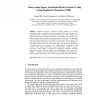Free Online Productivity Tools
i2Speak
i2Symbol
i2OCR
iTex2Img
iWeb2Print
iWeb2Shot
i2Type
iPdf2Split
iPdf2Merge
i2Bopomofo
i2Arabic
i2Style
i2Image
i2PDF
iLatex2Rtf
Sci2ools
132
click to vote
IPMI
2009
Springer
2009
Springer
Discovering Sparse Functional Brain Networks Using Group Replicator Dynamics (GRD)
Functional magnetic resonance imaging (fMRI) has become increasingly used for studying functional integration of the brain. However, the large inter-subject variability in functional connectivity renders detection of representative group networks very difficult. In this paper, we propose a new iterative method that we refer to as “group replicator dynamics,” for detecting sparse functional networks that are common across subjects within a group. The proposed method uses replicator dynamics, which we show to be equivalent to non-negative sparse PCA, and incorporates group information for identifying common networks across subjects with subject-specific weightings of the identified brain regions reflecting individual differences. Finding a separate network for each subject, as opposed to employing traditional averaging approaches, permits statistical testing of group significance. We validated our method on synthetic data, and applying it to real fMRI data detected taskspecific group...
| Added | 25 Jul 2010 |
| Updated | 25 Jul 2010 |
| Type | Conference |
| Year | 2009 |
| Where | IPMI |
| Authors | Bernard Ng, Rafeef Abugharbieh, Martin J. McKeown |
Comments (0)

